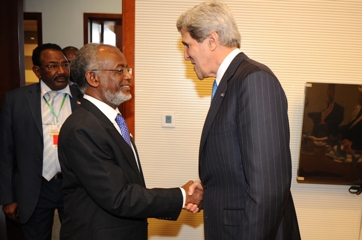Sudan FM blasts UK, while hailing stance of US, China
November 11, 2013 (KHARTOUM) – The Sudanese foreign minister, Ali Karti, has lambasted the UK, accusing it of standing behind all negative resolutions issued by the United Nations Security Council (UNSC) against his country.

He stressed that the UK arranged for UNSC resolution 1706 which sought to put Darfur under the mandate of the United Nations peacekeeping forces, as well as UNSC resolution 1593 which referred the situation in Darfur to the International Criminal Court (ICC).
Karti affirmed that the Sudanese government supports closer ties with London but said Khartoum has yet to see any signs for rapprochement in the UK’s official policies, legislations or organisations.
The top Sudanese diplomat added that one state minister at the UK foreign ministry proclaimed himself a speaker on behalf of the ICC concerning president Omer Hassan Al-Bashir’s visit to Saudi Arabia for the Mecca pilgrimage.
Bashir is sought by the ICC for genocide, crimes against humanity, and war crimes he allegedly masterminded in Sudan’s western region of Darfur.
Sudanese official also offered rare praise of the United States, disclosing that the latter had played a significant role in the UN Human Rights Council’s (UNHRC) recent resolution which kept Sudan under agenda item 10 of technical assistance for another year, despite attempts by some parties to move Sudan back to agenda item 4 of monitoring.
“If the US hasn’t cooperated rigorously and clearly with Sudan, we wouldn’t have been able to move from item 4 to item 10”, he said
He thanked the US for its support, saying that Sudan must acknowledge the US position on this issue irrespective of the nature of relations between the two countries.
Karti further said that human rights issues in Sudan are being used by hostile countries to put pressure on the independent expert to move Sudan to item 4, pointing out that Sudan faces more difficulty in the UNHRC than in the UNSC.
He said that the US role should help improving relations between Sudan and South Sudan rather than complicating the situation, adding that dialogue between the two countries should give priority to removing Sudan’s name from the list of the states sponsoring terrorism and lifting economic sanctions.
Washington imposed economic and trade sanctions on Sudan in 1997 in response to its alleged connection to terror networks and human rights abuses. In 2007, it strengthened the embargo, citing abuses in Darfur which it says constitutes genocide.
In 2010, however, the US government announced it was easing sanctions on agriculture equipment and services, which allowed half a dozen companies to obtain export licenses.
Sudan has also been on the US list of states that sponsor terrorism since 1993, even though the two countries have strengthened their counter-terrorism cooperation since the September 2001 attacks on Washington and New York.
Karti said he informed the US administration that reaching an understanding between the two countries requires a clear vision on the future prospects of relations, pointing to Sudan’s continued efforts to normalise ties, despite the US decision to renew economic sanctions for another year.
US president Barack Obama announced the decision to continue with trade and economic sanctions last month.
Karti disclosed that they had adopted a new approach which aims to mitigate the impact of the sanctions and involves obtaining licences for US companies to work in Sudan in areas of health, agriculture, education, and technology.
However, the deputy speaker of the parliament, Samia Ahmed Mohamed, called for reciprocal treatment from the US, demanding the government prevent the export of Gum Arabic to US companies.
The foreign minister also noted that China and Russia blocked several UNSC draft resolutions which included sanctions against Sudan.
“We managed to abort several draft resolutions presented to the UNSC through a Russian or Chinese veto, or a joint Russian and Chinese veto”, he added
He said that China never backed down from defending Sudan even if it wasn’t asked to do so, citing the attempt made by the US representative at the UNSC to issue a resolution condemning Sudan’s stance on Abyei which was jointly thwarted by China and Russia.
Responding to MPs who criticised China’s stance, Karti said the Sudanese government should not ask other countries to give more than it provides to them, pointing out that China’s investments in the US surpass $110 billion compared to $9 billion in Sudan.
“International politics isn’t based on emotions, but the ability to influence stances”, he added
He denied that Sudan asked China to veto a decision to refer the Darfur issue from the UNSC to the ICC.
In a separate issue, the Sudanese official accused the media of damaging Sudan’s relations with Egypt and revealed Cairo’s suspicions about the size of the proposed border crossing between the two countries, saying that a technical committee is investigating the concerns.
He said that if the committee convened, there would be an opportunity to open the border crossing, stressing that if the Sudanese government wants the Egyptian media and public to refrain from expressing views on Sudanese affairs, it should also ban Sudanese commentators from writing on Egyptian affairs.
Meanwhile, Mohamed launched a fierce attack on Egypt for hosting opposition leaders and allowing them to distort Sudan’s image through media outlets.
She demanded the Sudanese government take firm action against Egypt, stressing that the only era Egypt refrained from hosting Sudan’s opposition was during the rule of the former president Mohamed Morsi.
The foreign minister said relations with Juba still face considerable challenges and risks emanating from unnamed elements within the South Sudanese government, as well as external elements which don’t want the two countries to live in peace.
In a separate context, Karti acknowledged the lack of coordination with other ministries and government bodies on external activities, but added the activities of other ministries are not governed by the foreign ministry.
(ST)

